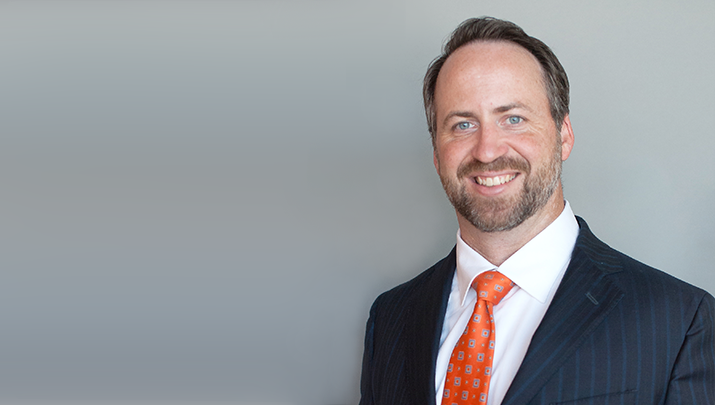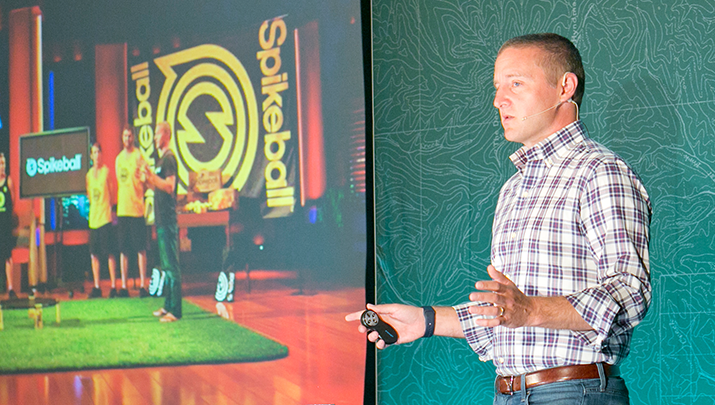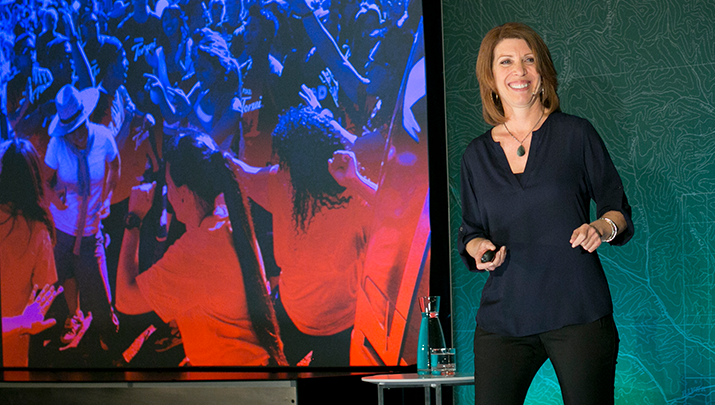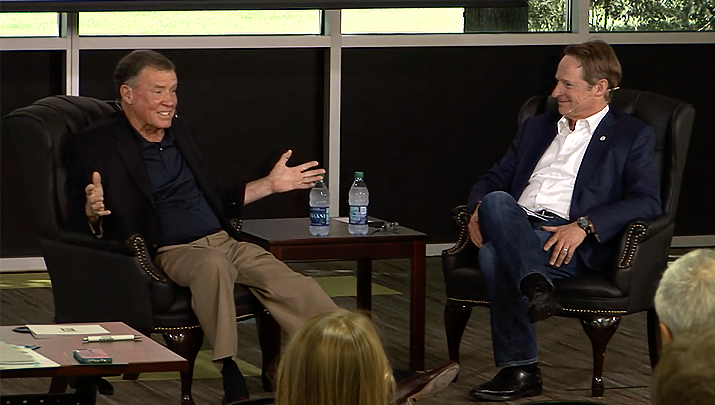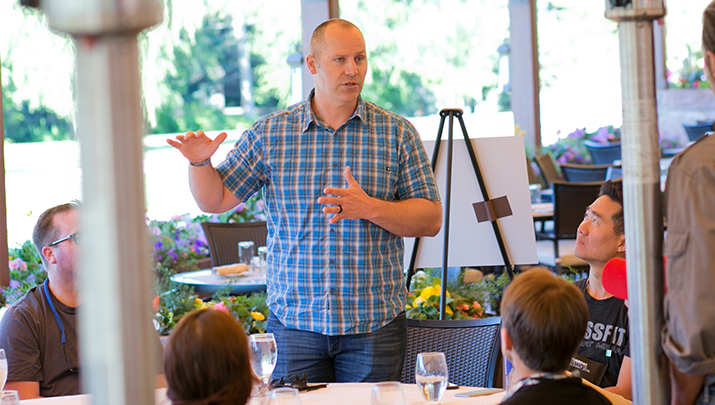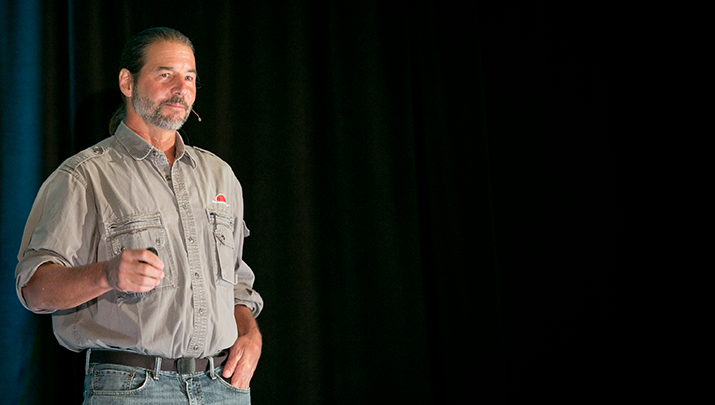Don’t Throw Shade
“ ‘Don’t throw shade’ is what the kids are saying these days,” says John Garrett, founder and CEO of Community Impact Newspaper. “Basically what that means is ‘Don’t rain on my parade.’ ” That’s the message he has for detractors who think he’s crazy for running a print news company in 2017.
Garrett says that like David facing Goliath, Community Impact Newspapers is up against modern-day media giants — not Cox or Hearst, but Facebook and Google. In the Bible, David, an expert slingshot marksman, selects five smooth stones to fell Goliath. In this entertaining video, Garrett describes his company’s armament — five values that bolster its courage in a difficult market — and outlines the open-book management process that motivates his staff.
Spikeball’s Accidental Community
In 2003, while on vacation with his brother and some friends, Chris Ruder pulled out a battered toy he loved to play with on the beach and a phenomenon was born. He realized the game, which he later named Spikeball, might have universal appeal. He was right. Here, Ruder recounts the formation of his company and the role community has played in its success. "They are 99.9 percent of the reason we've done so well," he says. His story teaches Evergreen leaders the value of learning to listen when the marketplace speaks — both at the inception of a company and throughout its evolution.
What Would You Tell Your 24 Year Old Self?
Imagine if you could manipulate space and time to send a message to your younger self that might put you on a swifter and surer path to success and happiness. In this candid video, Tugboat Institute members share what they wish they’d known when they were 24 — advice on being brave, staying true to oneself, exercising patience and other cornerstones of Evergreen entrepreneurship.
Featuring: F.K. Day, Carrie Van Winkle Greener, Amy Simmons, Jed York, Chris Mittelstaedt, Howard Behar, Lisa Rissetto, Bill Betts, Jess Rovello, John Duffy, Melanie Dulbecco and Mac Harman.
Jumping the Growth Curve - A Learning Journey
Who would have thought a scrappy little flavor company could transform itself into a 90-year-old startup? After leading Torani in achieving 25% growth per year for 15+ years, Melanie Dulbecco saw growth rates fall to low-single digits. She wondered if the maker of flavored syrups and sauces would ever be able to achieve startup-like growth again. Given poor economic conditions and amassing competition, low growth seemed a reasonable reset to expectations. Refusing to believe that, this self-professed strategy geek committed to a year-long “Learning Journey” with her management team, meeting with and learning from innovative companies about creating a culture for sustained growth.
In her Tugboat Summit 2016 talk, Dulbecco shares her insights and guiding principles for an effective Learning Journey and explains how this approach has shaped Torani’s culture of Pragmatic Innovation and Paced Growth.
Q&A With Jack Stack and Dave Whorton
For Evergreen entrepreneurs, few figures are as inspirational as Jack Stack, who has lived the 7Ps for decades. In this intimate, wide-ranging Q&A, which took place at this fall’s Tugboat Institute @SRC event in Springfield, Missouri, Stack shares stories from his youth and the thrilling first years of entrepreneurship, as well as his philosophies on management and parenthood. We hope you enjoy this candid talk with a true Evergreen icon.
Chasing After Joy and Eating It Up
Robyn Sue Fisher’s story is one of Pragmatic Innovation and good old-fashioned invention. For Fisher, founder and Chief Brrrrista of Smitten Ice Cream, ice cream is all about experiencing joy in the present moment. It’s also all about serving customers a superior product free of unnecessary additives. A self-described “super nerd,” she set out to make fresh-to-order ice cream with only natural ingredients. With the help of a brilliant engineer, liquid nitrogen, her life savings and tremendous Perseverance, she invented a machine that made her vision possible and rolled out her first “store” on the back of a Radio Flyer wagon.
In her Tugboat Institute Summit 2016 talk, Fisher breaks down what matters most in building her Evergreen business: creating joy for employees and customers, and committing unwaveringly to being the best.
Finding Your Team’s Harmonic Gait
Navy Seal Commander Rorke Denver refers to himself as a “sheepdog.” While serving in Iraq, he discovered he had a particular talent for taking care of, and protecting, others. He was there for his men during dozens of missions and he rose through the ranks to become a decorated leader, eventually recruiting and training cadets. Denver learned to value things like character, resilience and empathy over test scores and varsity letters. Like any good Evergreen leader, he realized that the qualities of his team were more important than their qualifications.
Jack Stack On Why Everyone Should Play The Great Game Of Business
At the Tugboat Institute’s most recent exemplar visit, members were able to hear Jack Stack tell the story of how he came up with The Great Game of Business after taking out a massive loan to buy out SRC from a failing International Harvester. With no experience running a company, he had to make up the rules as he went along and trust in his employees.
He quickly realized that the only way the company would thrive was if he taught the employees that the product was now the company. Understanding people hate to lose and love to win, he turned opaque company finances into an open game with rules, scoreboards and rewards. His employees returned his trust with amazing feats of entrepreneurialism that have helped grow SRC into a company with over $550 million in revenues and many successful offshoots.
People First From 28 To 15,000 Stores
When Howard Behar joined Starbucks as president in 1989, the company had just 28 stores. Through his leadership, early actions and behaviors he established a People First culture and led the coffee giant’s expansion to over 15,000 stores internationally.
In a discussion with Tugboat Institute CEO Dave Whorton, Behar shares his life story and reveals how a single lesson from his dad in their family’s grocery store forged his deep-seated belief that the meaning of life is to serve others. Behar, who contends that all businesses are in the people business whether they realize it or not, shares the most important lessons from Starbucks’ growth, and what he’s learned in the years since that chapter of his life ended.
Being Evergreen Helped Me Serve A Broader Purpose
F.K. Day and his brother Stanley Day started SRAM Corporation in 1987 with a passion for biking and innovation. The early years were not easy — the Days learned some hard truths about private equity backers and the importance of cultural fit when making acquisitions. Eventually they found their stride, and SRAM became a leader in high-end bicycle components, and a consummate Evergreen company.
But F.K. ultimately would have an even larger impact on the world. Moved by the 2004 tsunami disaster in Indonesia, he wanted to do more than send checks to relief funds — he was compelled to provide tangible aid. He soon found that something as simple as a single bicycle could change a family’s future for the better. Using Pragmatic Innovation, he took what he knew about high-end bikes and created an efficient, scalable model for producing low-cost, rugged bikes. The end result: World Bicycle Relief, which provides bicycles to students, health-care workers and entrepreneurs throughout Africa, South America and Southeast Asia.
